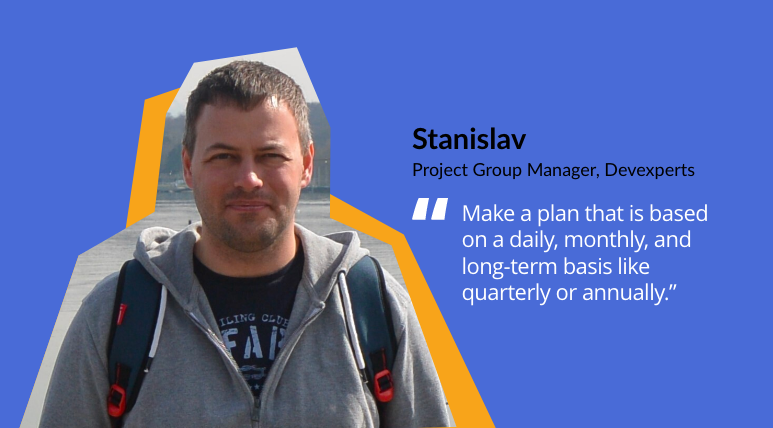Devexperts Hacks
to Improve
Your Focus
We’ve all been there – finding it difficult to concentrate on a daunting task at work or while studying for a vital exam, and wishing for the increased ability to focus. There’s a wide variety of reasons which can affect concentration such as age, lack of sleep, or an inability to tune out distractions. Whatever the case may be, there are a number of exercises that can help train your brain and boost focus in the long-run.
When do we most often lose concentration?
“Usually, I lose concentration in circumstances when I am involved in numerous communications that are dramatically different from the context of my thoughts or my things to do. Additionally, when I have long, boring meetings with no agendas and no results.” – Stanislav, Project Group Manager
“I lose concentration most often in long or unstructured meetings. Meetings, in general, don’t need to be as long as they mostly are, there is a lot of wasted time. If they are structured and their purpose is clear to everyone then they can be much more effective. It’s also important not to drift away or get into details that are not relevant to the majority of the group, If this is the case speak after the meeting.
This is really important in the current environment where meetings are virtual, it’s hard to read other people’s reactions and concentration levels over Zoom meetings, especially if only audio is used.” – Jon, VP of Trading Solutions
Train Your Brain Like a Muscle
When you decide to get in shape, you cannot take on the most intense workout on your very first training session. Instead, you’d gradually begin to incorporate new, more difficult exercises as you progress. This is no different in regards to training your brain. For instance, the “Pomodoro Method” says that you should focus on a particular task for 45-minutes straight, followed by a 15-minute break. This is easier said than done, however, when you are easily distracted. Instead, start off by focusing for 5 minutes at a time, followed by a 2-minute break. Gradually, increase the focus and break time in the days to follow until you eventually are able to focus for 45 minutes at a time with a 15-minute break. You can then try to increase focus time, and minimize break times to shorter intervals.
Furthermore, games like sudoku, crosswords, chess, and memory games help train your brain tremendously.
Create a To-Do List
“ One of the best practices in my opinion is to make a plan and to follow it. The plan should be based on a daily, monthly, and long-term basis like quarterly or annually. The daily plan should be made at the beginning of the day, 10-15 minutes during which you identify current and routine tasks you must achieve. Throughout the day I turn back to the plan and review the progress, mark completed tasks, and reprioritize uncompleted ones.
The same approach should be taken with regard to a monthly and long-term basis. In terms of the monthly plan, it should correspond to the goals of the long-term plan and include to-do items that bring you closer to achieving long-term goals. A long-term plan mostly consists of the goals and things I want to achieve.” – Stanislav, Project Group Manager

Create a Distraction To-do List
“One thing that can affect my concentration is when I have to deal with some secondary tasks that are not related to my work. Instead, what I try to do in this scenario is to postpone these trivial tasks for non-working hours.” – Emanuel, Senior Software Developer

We’ve all been there – working on a task when some random, nagging questions begin popping into our brains. Is there anything interesting on my Facebook newsfeed? What will the weather be like this weekend? What’s the name of that actor?
Instead of pausing what you are doing in order to find the answers to these questions immediately, make a list. Promise yourself that you will come back to this list and find those answers as soon as you’re done with your task. It takes approximately 25 minutes to return back to your original task once distracted. Is it really worth it?
Exercise
This may sound unlikely, but doing physical exercise does in fact benefit your focus. Research has found that students who did moderate exercise prior to taking an attention span exam, did significantly better than those who didn’t. Furthermore, the study showed that exercise helps our ability to ignore distractions, though it’s uncertain why.
Memorize Stuff
Though it may sound boring, memorizing things helps exercise your brain muscles tremendously. Whether it be a poem, lyrics to a song, or a scene from a movie, make it a priority to memorize one thing each week. And hey, it may come in handy as a cool bar trick in the future.
Set Yourself Up for Success
“To stay focused, one of the key aspects for me is having a comfortable and ergonomic environment, with a clean desk that would allow me to avoid distractions.” – Emanuel, Senior Software Developer
“This is important, especially when working from home without colleagues around to remind you that you are actually at work. I have to make sure I find a place without distractions where I can focus on work, sitting in the kitchen definitely does not work for me, I have set up a comfortable home office space away from it all.
Once I am comfortable and without physical distractions, I plan and prioritize my tasks. It’s important to try and stick to these, spending quality time rather than jumping to see each email or slack notification straight away, obviously, there is a balance to control here.” – Jon, VP of Trading Solutions

Read Long Things Slowly. Say No to TL;DR!
The amount of available e-content has drastically increased over the past decade. This sounds great, doesn’t it? Well, actually a study done by Slate, suggests that a mere 5% of readers who start reading an online article will actually finish it. Furthermore, only approximately 38% of readers go beyond the first few paragraphs.
Though e-content has increased significantly, we aren’t reading more. Instead, we are scrolling and skimming, in search of easily accessible information. This, in turn, promotes a lack of focus and willingness to understand the information provided to us more deeply.
A way to improve this is not only by reading books but at least one or two long articles per week. There is an overwhelming amount of long-form journalism currently available which can provide in-depth, quality content to its readers.
Here are a few resource suggestions:
Stay Curious
“Try to attend steadfastly to a dot on the paper or on the wall. You presently find that one or the other of two things has happened: either your field of vision has become blurred, so that you now see nothing distinct at all, or else you have involuntarily ceased to look at the dot in question, and are looking at something else. But, if you ask yourself successive questions about the dot,—how big it is, how far, of what shape, what shade of color, etc.; in other words, if you turn it over, if you think of it in various ways, and along with various kinds of associates,—you can keep your mind on it for a comparatively long time. This is what the genius does, in whose hands a given topic coruscates and grows.”
This is a great example by William James regarding how staying curious about a certain topic can improve your focus concerning it. Give this a try when you find your mind wandering while working on an important task.
Perform Concentration Exercises
Though the above tips are bound to help improve your focus, it’s important to do some exercises that are aimed solely at boosting concentration. Here are some simple, yet productive exercises to train your brain towards greater focus.
1. Take any book you’d like and mentally count the number of words in a given paragraph. Afterward, count them again to ensure that the number is correct. Gradually increase the sections you are counting to 2 paragraphs, 3 paragraphs, and eventually a whole page. Do the counting only in your head and don’t use a finger to follow along.
2. Count backward in your head from 100 to 1. Once you’ve done that, count backward from 100 to 1 while skipping every 3 numbers (100, 97, 96, 93, etc.)
3. Chose an inspirational word or phrase and repeat it mentally to yourself for 5 minutes. Once you’re able to do that, increase the time to 10 minutes.
4. Hold an apple in your hands and focus on it. Examine its shape, smell, color, and the sensation you feel while holding it. Ignore all distractions and questions which may arise during this time. Remain calm and simply bring your attention back to the apple if you find yourself being distracted. Alternatively, focus on the fruit for 2 minutes, close your eyes, and try to imagine a clear, well-defined image of the apple.
5. Once you are proficient in the above exercises, try to stay 5 minutes without any thoughts. Through regular practice, you’ll be able to impose silence on your thoughts, even if only for a short while.
For more resources, tools, and tips for a good work-life-balance, please visit the following links:
Work from Home Principles during a Pandemic – In our new world under lockdown, companies are scrambling to convert their businesses to a WFH style of communication and collaboration. Devexperts put together a comprehensive work from home guide not only for us but for everyone experiencing this paradigm shift happening all over the world.
Udemy Course: “Modern Productivity — Superhuman Focus In A Distracted World” – Boost your productivity, reclaim your focus, and achieve your goals with this proven approach to personal productivity!
Udemy Course: “10X SUPERHUMAN Focus: Maximize Your Brain & Focus” – ULTIMATE Focus Training: Discover a step-by-step system for accelerating your focus without stress or procrastination.